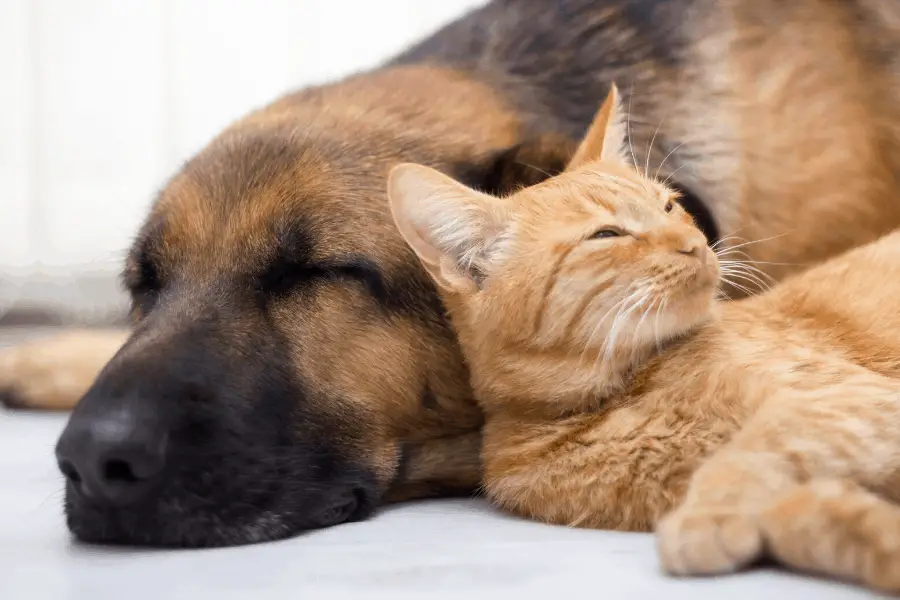
A flea infestation on your pet is a serious problem as it can carry serious diseases and parasites such as tapeworms and Murine Typhus
So, if your feline friend has picked up a circus of fleas in its travels how likely is it that your pup is also going to be a host in the near future?
The most common North American flea species will happily spread from cats to dogs and to any other mammal for a blood source. Common Known as ‘cat fleas’ this insect will infest your entire home if left to its devices. In other places, such as Europe, the ‘dog flea’ is more prominent and doesn’t do well on feline blood.
Although the likely hood is that when your cat gets fleas they will pass it on to their dog brother or sister, there is more to know than this.
Below I’ve gone through all the things you need to know about identifying, treating, and preventing the spread of fleas from cats to dogs, so please continue reading for more information.
How do cats and dogs get fleas?
Cats and dogs will contract fleas by coming into contact with an infected animal. Fleas can also be transmitted by direct pet-to-pet transmission, or from a human’s clothing and bedding to the pets in their home environment
The most common way for cats to get flea infestations is through cat bites that have been inflicted on them during playtime. As the cats are getting up close and personal, it offers a perfect opportunity for the fleas to jump from one animal’s fur onto the other.
The most common way for dogs is through direct contact with an infected dog or cat, and then bringing those unwanted hitchhikers back home where they can spread throughout your entire house!
The best thing you could do if this happens would be a thorough vacuuming of your home, especially the soft furnishings and to wash your pet’s bedding and also your own sheets.

Why do fleas spread from cats to dogs?
The simple reason that fleas spread from cats to dogs is that they are both mammals. This means that they have similar body temperatures, which is what fleas need to survive.
To a flea, one source of blood is much the same as another. This is certainly true of ‘cat fleas’, or to give them their scientific name, Ctenocephalides felis, which are happy to feed on the blood of both cats and dogs.
Now, we all know that some cats and dogs can’t stand each other, even when living under the same roof. So how would fleas spread without direct contact?
The answer is that fleas can jump up to six feet in the air, so they don’t need direct contact. They just have to be close enough to jump. Also, fleas are able to survive for up to a month without feeding, so they can live on the blood of one animal for that long while not actually being attached.
That means they could be hanging around in soft furnishings until they find another host. Fleas can also spread from pets to humans, so it’s important that you take steps not only for your pet but yourself too!
It’s also possible for a dog or cat with an infestation of parasites on their fur and skin (such as ticks) can carry them onto another animal in the household who doesn’t already suffer from this problem – such animals include rabbits!
So when you find fleas you want to act as quickly as you can to get rid of them
How to treat fleas in a natural way?
The best way you know if your pet has fleas is by checking for them on their skin and in between fur! You should also be looking out for any redness or irritation around its neckline as this could indicate an allergic reaction from being bitten too many times.
The ideal way to treat a pet for fleas is to use a natural remedy. There are many different types of these remedies available, but the best ones contain ingredients that kill fleas and their eggs without harming your pet.
The basic idea is to make your pet an unpleasant host, and aroma is by far the best way to do this.
You can use a range of essential oil anti-flea sprays, such as Citronella, eucalyptus, peppermint, tea tree, and rosemary, as well as making a homemade collar.
The collar can be made by soaking a strip of cloth in water mixed with one teaspoon each, lavender oil, and peppermint extract.
Other ways to dissuade fleas from sticking around are by changing or adding something to your pet’s diet. Diluting vinegar or apple cider vinegar into your pet’s drinking water is a good way to do this.
A few other ways are by cayenne pepper or turmeric into your pet’s food you can also help ward off fleas. Another method, and perhaps one you’ve never thought of is to add brewer’s yeast, about half a teaspoon, to your pet’s food. You can buy this quite easily online, and perhaps you’ll even start a new hobby by becoming a homebrewer.
If you have a cat, it’s important to keep them indoors so they don’t bring more fleas into your home while treating them.
How to prevent your pet from getting fleas?
Prevention of fleas is very much like the treatment of fleas, you need to make your pet as unattractive to them as possible.
If you notice your dog or cat scratching a lot, it could be fleas! Flea bites can cause an allergic reaction in some animals which leads to itching or hair loss around their neck/chest region (hot spots). This is often accompanied by redness of skin in these areas as well.
So, when you see this act fast.
Always use some sort of method of flea prevention, be it a natural remedy or commercial preventative such as a flea collar. All pets can get fleas, but some are more susceptible than others.
Honestly, the best way to prevent fleas is by using a commercial product, such as Frontline or Advantage but if you have several pets or a tight budget, you can look to more natural remedies such as the ones I’ve mentioned above.
You should also be checking your pet’s fur for signs of fleas.
If you find fleas on your pet, it is best to treat the animal and its environment. You can use a commercial product or natural remedies such as diatomaceous earth (DE) powder for this purpose.
Just make sure that you but be sure that you choose methods that work for adult fleas and their eggs in addition to being safe around pets!
In addition to treating your pet, you should regularly vacuum your house and wash all bedding, yours, and your pet’s.
Do fleas spread more during the summer months?
Fleas, along with other parasites such as ticks, are more prevalent during the warmer seasons but are present all year round.
That means that while you definitely need to be on your guard for fleas in summer, you should also be vigilant all year long.
A common misconception is that fleas are only a problem during the summer months, but this isn’t true at all! Flea season can last from April to November in some parts of North America and they’re present throughout most regions for all of the year.
Fleas don’t necessarily die off in the coldest winters either. An adult flea can live for up to a half a year (100 days) without feeding, so they can survive the winter with temperatures as low as 46°F (7°C) for up to 10 days.
Can a human get fleas from a cat?
The most common way for humans to get flea infestations is through direct contact with an infected dog or cat, and then bringing those unwanted jumpy guests back home where they can spread throughout your entire house!
Fleas, as you may know from history class, can carry many diseases which affect pets and humans alike.
One of the most common diseases that fleas can transmit to humans is the plague.
Plague, also known as Black Death or The Great Mortality in Europe during 1347-1351 AD was a devastating pandemic that killed an estimated 75 million people!
Luckily, the black death is not something you need to worry about but typhus and Bartonella (from cat scratch disease) are really possibilities along with tapeworms.
Flea bites are not only itchy and annoying. The best thing you could do if this happens would be to quickly vacuum the area and wash the pet’s bedding.
Fleas can be a nuisance for both humans and pets alike, but with the right tools, they are easy to manage! If you have any questions or concerns about flea prevention methods please reach out to your local vet who can help you both treat and prevent flea infestations.





